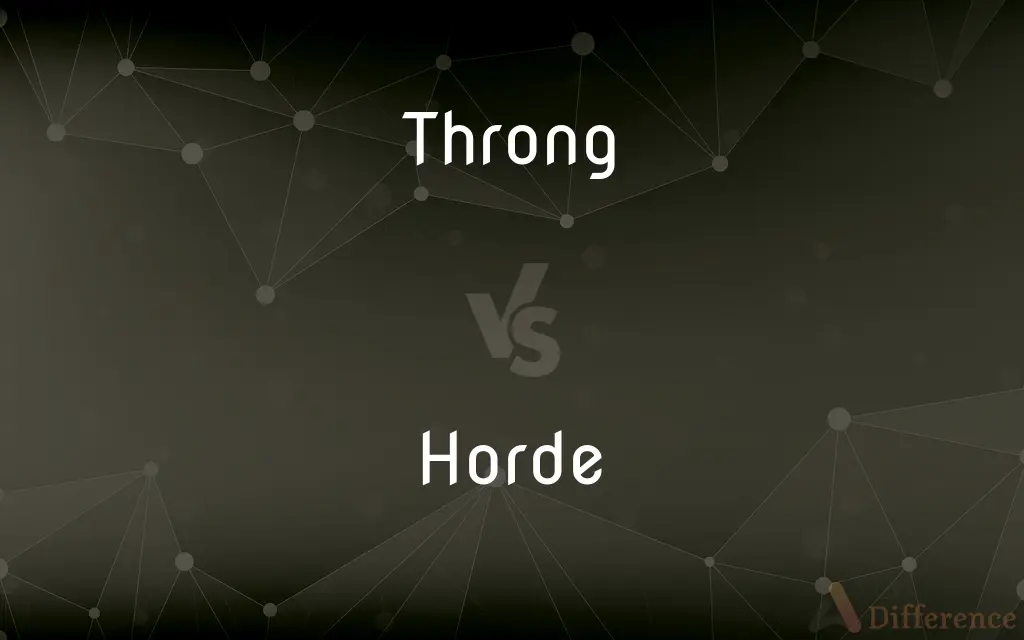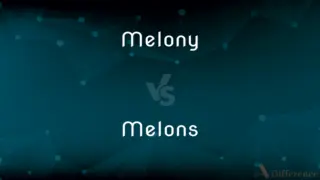Throng vs. Horde — What's the Difference?
By Tayyaba Rehman & Urooj Arif — Updated on April 29, 2024
Throng refers to a large, densely packed crowd of people or animals, often implying some order, while horde suggests a large, unorganized group, typically with a negative connotation.

Difference Between Throng and Horde
Table of Contents
ADVERTISEMENT
Key Differences
Throng typically denotes a large group of people or animals gathered closely together, often used to describe crowds in cities or at events, suggesting a sense of compactness and sometimes orderliness. Whereas, horde refers to a large group that is less structured, often used pejoratively to describe overwhelming numbers in a somewhat chaotic manner.
Throng is often used in contexts that imply a neutral or positive connotation, such as a throng of fans at a concert, indicating a dense but controlled gathering. On the other hand, horde is frequently employed to evoke images of invasion or disorder, as in a horde of locusts devastating crops.
Throng can also suggest a temporary gathering, where individuals converge for a specific purpose and then disperse. Whereas hordes often imply a more persistent or looming presence, potentially threatening stability or peace.
Throng may carry historical or literary connotations, used in descriptions where the emphasis is on the magnitude of the gathering. Conversely, horde is rooted deeply in historical and fantasy contexts, often associated with vast, unruly armies or groups in narratives about battles and conquests.
Comparison Chart
Connotation
Neutral, sometimes positive
Often negative
ADVERTISEMENT
Organization
Implies a degree of order
Suggests lack of structure
Usage Context
Crowds, gatherings
Large groups, often in invasions
Implied Behavior
Gathered closely, orderly
Unruly, overwhelming
Historical Usage
Less specific, more general
Frequently used in warfare contexts
Compare with Definitions
Throng
A large, densely packed crowd of people or animals.
The throng at the concert cheered loudly.
Horde
A large group, especially a disorganized one perceived as a threat.
A horde of zombies approached the town.
Throng
A multitude of people gathered for a common purpose.
A throng of protesters filled the square.
Horde
To gather in a large, unruly group.
Tourists horded at the gates.
Throng
A crowded condition or mass of objects.
A throng of ideas flooded his mind.
Horde
An overwhelming number or swarm.
A horde of questions bombarded the speaker.
Throng
To crowd or swarm around something.
Fans thronged the movie premiere.
Horde
Used to describe wild or primitive groups.
Hordes of barbarians invaded the empire.
Throng
To gather in great numbers.
Tourists throng to the city during the festival.
Horde
A large group moving or acting together.
Hordes of shoppers rushed to the sale.
Throng
A large group of people gathered or crowded closely together; a multitude.
Horde
A large group of people
A horde of beery rugby fans
Throng
A group of people crowded or gathered closely together.
Horde
A small loosely knit social group typically consisting of about five families.
Throng
A group of things; a host or swarm.
Horde
A large group or crowd; a swarm
A horde of mosquitoes.
Throng
(transitive) To crowd into a place, especially to fill it.
Horde
A wandering troop or gang; especially, a clan or tribe of a nomadic people (originally Tatars) migrating from place to place for the sake of pasturage, plunder, etc.; a predatory multitude.
Throng
(intransitive) To congregate.
Horde
A large number of people or things.
We were beset by a horde of street vendors who thought we were tourists and would buy their cheap souvenirs.
Throng
(transitive) To crowd or press, as persons; to oppress or annoy with a crowd of living beings.
Horde
To travel en masse, to flock
Throng
Filled with persons or objects; crowded.
Horde
A wandering troop or gang; especially, a clan or tribe of a nomadic people migrating from place to place for the sake of pasturage, plunder, etc.; a predatory multitude.
Throng
Busy; hurried.
Horde
Any large group of people or animals, especially one wandering or moving about; as, the movie star was surrounded by a horde of screaming fans.
Throng
A multitude of persons or of living beings pressing or pressed into a close body or assemblage; a crowd.
Horde
A vast multitude
Throng
A great multitude; as, the heavenly throng.
So, with this bold opposer rushes onThis many-headed monster, multitude.
Not to know me argues yourselves unknown,The lowest of your throng.
I come from empty noise, and tasteless pomp,From crowds that hide a monarch from himself.
Horde
A nomadic community
Throng
To crowd together; to press together into a close body, as a multitude of persons; to gather or move in multitudes.
I have seen the dumb men throng to see him.
Horde
A moving crowd
Throng
To crowd, or press, as persons; to oppress or annoy with a crowd of living beings.
Much people followed him, and thronged him.
Throng
To crowd into; to fill closely by crowding or pressing into, as a hall or a street.
Throng
Thronged; crowded; also, much occupied; busy.
To the intent the sick . . . should not lie too throng.
Throng
A large gathering of people
Throng
Press tightly together or cram;
The crowd packed the auditorium
Common Curiosities
Can throng have a positive meaning?
Yes, throng can be used neutrally or positively to describe crowds at enjoyable events like concerts.
Is horde always used negatively?
Mostly, horde carries a negative tone, especially in contexts involving overwhelming or threatening groups.
What is a throng?
A throng is a large, densely packed crowd of people or animals, often with a sense of order.
What does horde mean?
Horde refers to a large, unorganized group, often with a negative connotation.
How do throng and horde differ in usage?
Throng is more common in everyday contexts, while horde is often used in historical, military, or fantasy scenarios.
Can animals be described as a throng or horde?
Yes, animals can be described by either, depending on the context and the nature of the group.
Are throng and horde interchangeable?
No, due to their different connotations and typical contexts, they are not usually interchangeable.
What is an example of a horde in literature?
A horde often appears in fantasy or historical narratives as a large army or group of invaders.
What is an example of a throng in literature?
In literature, a throng might refer to a large group of characters gathering in a city or at a social event.
How does the organization differ between a throng and a horde?
A throng implies some level of order and closeness, whereas a horde suggests disorganization.
Does the meaning of horde relate to specific activities?
Yes, horde often relates to activities involving large, chaotic or aggressive groups, such as raids or invasions.
Which term is older, throng or horde?
Both terms are quite old, but horde has strong historical associations with ancient armies and groups.
How can one visually distinguish a throng from a horde?
A throng might look more orderly and dense, while a horde would appear more scattered and chaotic.
What synonyms are there for throng and horde?
Synonyms for throng include crowd, multitude, while for horde, swarm, mob are appropriate synonyms.
Does the meaning of throng relate to specific activities?
Yes, throng can relate to activities involving large, orderly crowds, such as festivals or public gatherings.
Share Your Discovery

Previous Comparison
Nowadays vs. Now
Next Comparison
Melony vs. MelonsAuthor Spotlight
Written by
Tayyaba RehmanTayyaba Rehman is a distinguished writer, currently serving as a primary contributor to askdifference.com. As a researcher in semantics and etymology, Tayyaba's passion for the complexity of languages and their distinctions has found a perfect home on the platform. Tayyaba delves into the intricacies of language, distinguishing between commonly confused words and phrases, thereby providing clarity for readers worldwide.
Co-written by
Urooj ArifUrooj is a skilled content writer at Ask Difference, known for her exceptional ability to simplify complex topics into engaging and informative content. With a passion for research and a flair for clear, concise writing, she consistently delivers articles that resonate with our diverse audience.
















































